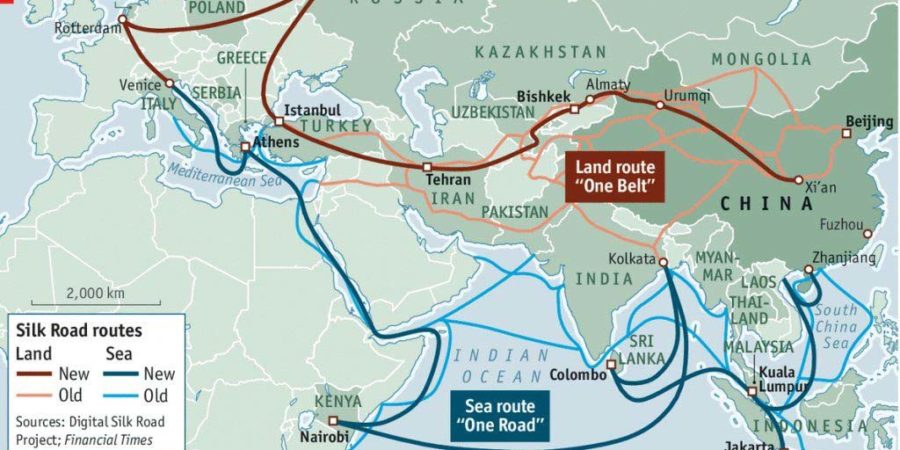CPEC Updates

ISLAMABAD, (DNA) – The 7th meeting of the Joint Coordination Committee of the China-Pakistan Economic Corridor project on Tuesday approved long-term plan of the corridor, however, no concrete decision was reached over the ML-I (railway track), special economic zones or Karachi Circular Railway.
“LTP was approved by the JCC, which covers the development journey till 2030 and will bring new industrial technology, agriculture development , infrastructure and information technology to the country,” said Federal Minister for Planning Development and Reforms Ahsan Iqbal here.
Briefing the media about the decision taken by the 7th JCC, the minister said after months of efforts finally the LTP was approved.
It was agreed to constitute a Joint Working Group on Agriculture, under the LTP, which will help Pakistan to modernise its agriculture sector.
Pakistan is facing water shortage and in this regard Chinese expertise will be acquired to develop drip irrigation system in the country, Ahsan Iqbal added.
Regarding the SEZs, the minister said that China had collected the feasibility studies of the nine economic zones and they would reply after studying them.
On Monday, during the preliminary meeting of the JCC, it was agreed that three out of nine SEZs would go to the JCC for approval, however the Chinese had taken all the nine feasibility studies with them and the final decision in this regard would be made later.
Regarding ML-I, the minister said that the feasibility study was shared with the Chinese and agreement on financing would be signed later.
On KCR, it was agreed that a fresh feasibility study would be conducted by the Chinese, which would be followed by the financing agreement. The earlier study of the KCR was conducted by Japanese and now the Chinese will conduct fresh feasibility.
He said the 7th JCC had reviewed the projects approved during the 6th JCC and agreed upon the operationalisation of those projects.
It was decided that the projects whose feasibility are not ready will be further discussed by the JWGs, after the completion of feasibilities, and will be approved during the 8th JCC meeting.
Similarly, the projects in Gwadar were discussed and it was decided to accelerate the pace of work on all the projects.
It was decided that Chinese experts would study the feasibility study of the Gwadar Airport and work would be started during first half of 2018, the minister informed. He said that China was providing grant for the Gwadar Airport.
The minister said Prime Minister Shahid Khaqan Abbasi would on Wednesday (today) inaugurate 19km Gwadar Eastbay Expressway, which also included four kilometres long bridge over the sea.
Use of Chinese currency
Regarding allowing the use of Chinese currency in Gwadar, the minister said that no such demand was made, however they were considering making a plan with the State Bank of Pakistan to allow transactions in Chinese currency for the import of machinery.
Meanwhile, a press release issued here stated that the 7th meeting of the JCC of CPEC was held here on Tuesday to review and approve the various development projects in the mega development project. Ahsan Iqbal and his Chinese counterpart jointly headed the JCC meeting.
Around 150 high officials from Pakistan and China attended the meeting along with the chief ministers of all the provinces and the AJK prime minister. The representatives of private sector also participated in the meeting for the first time.
Addressing the JCC, Iqbal said the 7th JCC in Pakistan was a milestone towards realising the CPEC and noted that people of Pakistan valued the multi-faceted cooperation extended by the government and the people of China to Pakistan.
He said that the CPEC now entered into the first phase of its completion and 7th JCC was of historic significance to finalise the long-term plan of the project.
“The long-term plan will give new dimensions to bilateral cooperation between China and Pakistan,” Iqbal believed.
He said that the long-term plan would expand the scope of cooperation in various new areas including cooperation in social sectors along with economic field.
Along with infrastructure development and upgradation, education and health sectors would also be targeted for their improvement and upgradation under the CPEC .
About private sector’s representation, the minister said that it had been given to the private sector in the 7th JCC meeting to take on board private sector in that project, which was a game changer not only for Pakistan but for the entire region.
He announced that both countries would organise exchange of trade and business delegations at official levels to speed up the pace of the project.
Iqbal underlined the need for expansion in the administrative structure and scope of cooperation in the CPEC .
Speaking about Gwadar, gateway of the CPEC , Iqbal said that projects in Gwadar were of utmost importance for the people of Gwadar and for national development .
He said that the CPEC’s energy projects were fast heading towards their completion.
The establishment of special economic zones would now start after the 7th JCC, which is the hallmark of this project.
“Cooperation in industrial sector would ensure transfer of technology, knowledge and skills to Pakistan,” he remarked.
Iqbal opined that the CPEC was also helping to promote knowledge-based economy in Pakistan, which was the need of the hour.
Related News

FCC declares govt can impose Super Tax
ISLAMABAD, JAN 27 /DNA/ – The apex court has revived Sector 4 b of theRead More

Pakistan must prioritize exports for economic revival: ICCI
ISLAMABAD, JAN 26 /DNA/ – President of the Islamabad Chamber of Commerce and Industry (ICCI),Read More


Comments are Closed